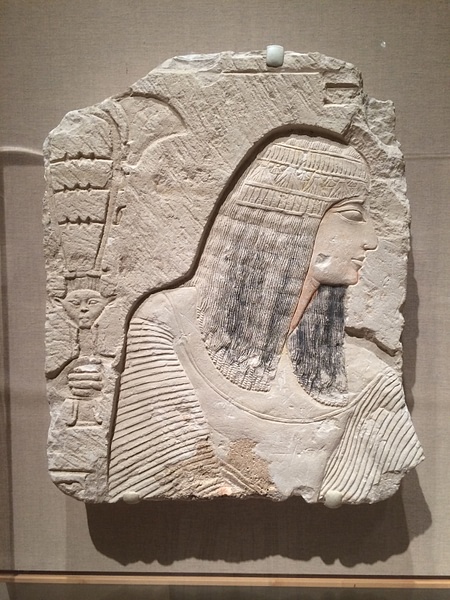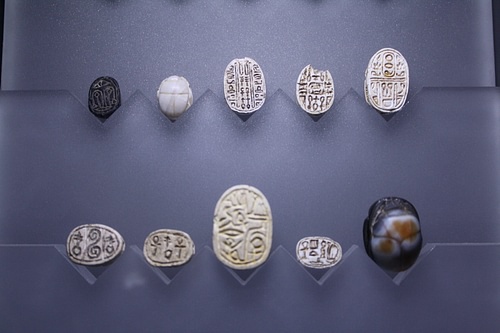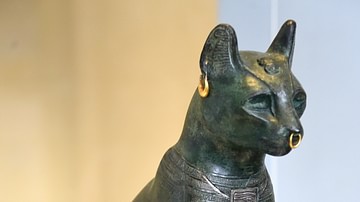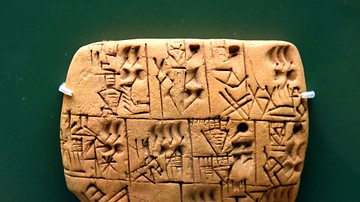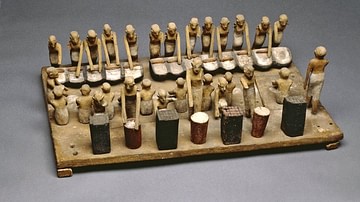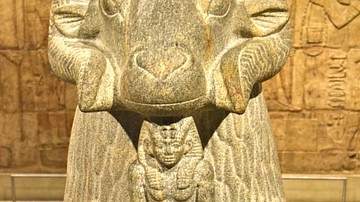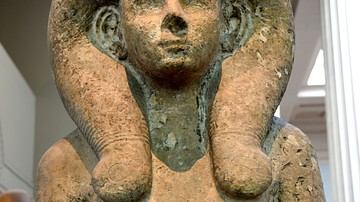Women in ancient Egypt had greater rights than in any other civilization of the time. They could own land, initiate divorce, own and operate their own business, become scribes, priests, seers, dentists, and doctors. Although men were dominant and held the most important positions in society as a general rule, there is ample evidence of positions in which women had authority over men. Women's authority is evident in the early medical schools, women ruling the country without a male consort, female seers and physicians, early beer brewers and textile work managers, 'sealers' who safeguarded important records and objects, and most notably through the position of God's Wife of Amun.
Although women took care of the house, the extended family, and the children, they were also free - if they had the means - to leave these responsibilities to a servant or other female family member and seek work outside the home. Just as in the present day, a mother would raise her daughter according to her own values and lifestyle, and so a woman who prioritized housework and family would most likely produce a daughter who did the same; there was, however, no cultural stipulation against women working and holding a number of important positions.
Many women, in fact, who had been raised to be housewives turned those skills into high-paying jobs in the homes of nobility and the upper class. Others, who found housework fulfilling and whose husbands and sons provided amply, were content to care for the home and family. There is no difference between this social structure and that of many societies today with the exception that, in ancient Egypt, it was understood that the man was the head of the household and had the final word in decisions. Even so, there is plenty of evidence to suggest that men consulted with their wives regularly and that the marriage was seen as an equal partnership.
Women at Home
Even though men held the place of authority, women kept the home functioning; whether they did so personally or supervised the work of servants. Even if a woman had a job outside the home, she was still responsible for maintaining it. Men are mentioned helping out with housework, but it was not their primary responsibility.
A wife and mother had many daily tasks beginning with the sunrise. She would need to wake her husband and children for work of school, maintain the family altar, prepare breakfast, clean up afterwards, tidy the house, make sure the home was free of pests and rodents, bring water from the well, ensure the stores of grain and other supplies were safe from contamination or pests, take care of the children if they were young, see to the needs of the other members of the extended family if they were elderly, feed the pets and make sure they were healthy, tend her personal garden, prepare the light afternoon meal, bake bread, brew beer, prepare the evening meal, take care of the weaving and sewing of clothing, sheets, blankets, and jackets, do the laundry, greet her husband and sons when they returned from work or school, serve dinner, clean up afterwards, feed the pets, put the young children to sleep, and prepare for bed.
Some women also chose to work from home, and so, in addition to their daily chores, they also had to make time for their job. Work-from-home usually had to do with baking, brewing beer, sandal-making, basket-weaving, jewelry work, seal-making, textile weaving, and making charms and amulets.
There were usually many other women in the house one could call on to help with these chores since Egyptians lived with extended families. There was no marriage ceremony in ancient Egypt; a woman simply moved with her belongings to the house of her husband or her husband's family. A married couple could find themselves living with the husband's widowed mother, aunt, uncle, and cousins when they were first setting up a home. This situation meant little privacy but a number of people on hand to help with chores.
The Domestic Cult
Each home had its own altar which had to be kept clean and neat. People did not go to the temples in town to worship their gods but held private ceremonies and rituals in their houses. These altars would usually have an image or statue of a patron god or goddess and offerings would be placed there along with prayers making requests or giving thanks. This practice was especially prevalent in the New Kingdom of Egypt (c. 1570-1069 BCE) and seems to have given rise to rituals which modern-day scholars refer to as the Domestic Cult or cults of domesticity.
These cults are suggested by archaeological discoveries and inscriptions which seem to indicate an elevated focus on appreciation of the feminine by focusing on female deities. Pretty much every home is assumed to have had a personal altar honoring the family's protective deities and ancestors, but these altars predominantly feature statuettes, images, and amulets of Renenutet (a goddess of protection in cobra form), Taweret (protective goddess of childbirth and fertility in hippo form), Bes (protective god of childbirth, children, fertility, and sexuality), and Bastet (goddess of women, children, hearth, home, and women's secrets). Scholar Barry J. Kemp notes how, in the worker's village at Deir el-Medina, there are paintings on the walls of the upstairs rooms which "supplied the focus for domestic feminity" (305). This cult is thought to have developed in response to the essential role women played in the daily life of the home.
Egyptologist Gay Robins notes how "the rites practiced in the domestic cult may have included offering food, libations, and flowers at the altar, as in other Egyptian cults" and that these rituals "suggest that women of the family had an important part to play" (163). While this is no doubt true, and there may well have been a "domestic cult," it is also possible that home altars during the New Kingdom simply celebrated the feminine aspect of divinity and protection more often than the masculine or that these kinds of altars have been found intact more than others.
It must be kept in mind that goddesses feature more prominently in Egyptian religious beliefs and stories than in those of other cultures and so it is hardly surprising to find home altars honoring the feminine. Bastet was not just a "woman's goddess" but one of the most popular deities in all of Egypt with both sexes, and the Cult of Isis became so popular that it would outlast every other Egyptian cult hundreds of years into the Christian era. The festivals of goddesses like Bastet, Isis, Hathor, and Neith were national events in which everyone participated just as they did for gods like Osiris, Ptah, and Amun.
Women in the Workplace
Egyptian culture empowered women from the time of the Early Dynastic Period (c. 3150 - c. 2613 BCE) through the Ptolemaic Period (323-30 BCE) as evidenced by powerful female rulers such as Neithhotep in the First Dynasty through Cleopatra VII in the Ptolemaic Dynasty. There does not seem to have been the necessity of a particular cult in the New Kingdom to elevate the feminine since women had been participating almost equally in Egyptian society for thousands of years by then.
For example, from the time of the Old Kingdom of Egypt (c. 2613-2181 BCE) women held the position of 'sealers' which was among the most important jobs one could have. In the 12th Dynasty of the Middle Kingdom (2040-1782 BCE) women were still in this position and the practice continued into the New Kingdom. Robins explains:
Sealing was one of the commonest duties of men throughout the bureaucracy because, in the absence of locks and keys, seals were used to safeguard property. A sealer carried the authorized seal with which to secure containers and storerooms against unauthorized entry. (118)
Women as sealers are evidence of their equality with men throughout Egypt's history. Even though, as in the home, men were considered the dominant authority figures, women could obviously hold the same position as long as they were not supervising and giving orders to men.
Even this point not does hold true in every era of Egypt's history, however, as it seems the female physician Peseshet (c. 2500 BCE) was a teacher at the medical school at Sais and the position of God's Wife of Amun, which became increasingly important in the Middle Kingdom of Egypt, was the female counterpart of the male High Priest. Female physicians would have seen both male and female patients, female seers would have interpreted the dreams and omens of males as well as females, and female dentists would have worked on alleviating the tooth pain of men as often as women.
Women also were the first beer brewers and textile manufacturers in Egypt and continued to manage workshops and breweries even when men took over the day-to-day operation of the business. Paintings, inscriptions, and statuary depict women working in as well as supervising over manufacture and distribution of goods. Women of means could also be the Mistress of the House meaning they owned their own land, produce, and means of harvest and distribution.
Those who had acquired particularly impressive skills in home management could make a living as Household Managers in the homes of the wealthy and nobility. These women were responsible for supervising the servants and making sure that every job was done to satisfaction as well as stocking the home with supplies and organizing official dinners and banquets. The title of Keeper of the Dining Hall was especially important to the upper-class nobility who entertained foreign diplomats and other dignitaries as the banquet prepared and served would need to be perfect in every way.
Women may have worked their way up to these kinds of positions from the lower status of maid, servant, or cook. Egyptologist Joyce Tyldesley writes:
An Egyptian woman of good character could always find employment as a servant; the lack of modern conveniences, such as electricity and plumbed water, meant that there was a constant demand for unskilled domestic labour. A servant's wages were relatively cheap and most middle- and upper-class homes had at least one maid who could be trained in domestic skills while helping out with the more arduous household chores. (134)
Girls would enter the service at a young age, sometimes around 13, and if they proved themselves to be conscientious and loyal, could move up to a higher position. These women were vitally important to the maintenance of a home, and numerous letters and inscriptions make this clear. A common practice in ancient Egypt was writing letters to the dead asking for help in some matter. These often assumed a problem was being caused by some supernatural entity, usually an angry ghost or spirit whom the deceased could reason with or confront.
In one of these letters to the dead from a wife to her departed husband, the woman asks for his intercession on the part of a serving girl who is ill. She writes:
Can you not fight for her day and night with any man who is doing her harm, and any woman who is doing her harm? Why do you want your threshold to be made desolate? Fight for her again - now! - so that her household may be re-established and libations poured for you. If there's no help from you, your house will be destroyed; don't you know that it is this serving maid who makes your house amongst men? Fight for her! Watch over her! (Parkinson, 143)
A good servant was often considered a member of the family, and in some eras, a childless couple would adopt a servant as heir to ensure that their mortuary rites were performed correctly and that there would be someone to leave their estate to. In the above letter, the wife threatens the husband with cutting off his food and drink offerings ("why do you want your threshold to be made desolate?") if he does not intercede on the girl's behalf. This was a very serious threat because it was thought the dead required daily sustenance in the afterlife and it shows how much this serving girl meant to the author of the letter.
If a woman did not care for domestic work, she could be an entertainer. Women are recorded as musicians, singers, and dancers whether publicly or for temple rituals. Women could also be sacred singers who accompanied and assisted the God's Wife of Amun at Thebes and, in some instances, succeeded to that position. In order to become a God's Wife, the woman would need to know how to read and write and so, although a number of scholars claim that women lacked this skill, there seem to have been more of them than are credited.
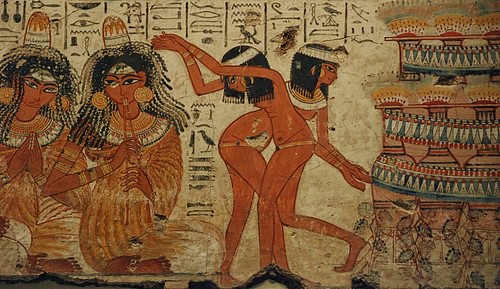
Evidence for women's literacy comes from ostraca (clay pot shards) with notes on them relating to childbirth, children, dressmaking, laundry, and other domestic issues. These ostraca are the ancient equivalent of the modern day to-do list in some cases and, in others, are either protective charms or execration texts. Whatever form they take, there is no doubt they were written by women.
Women were denied high positions such as vizier and, save for some notable exceptions, the monarchy, but they certainly had greater opportunities for personal advancement and financial gain than their sisters in neighboring countries. Women were essential figures as midwives, seers, and tattoo artists - though it is unclear if they were paid for these services - but also feature prominently in positions most often held by males. The women of ancient Egypt were largely the directors of their own fate, and in many cases, the only limit to their success was their own talent and imagination.
